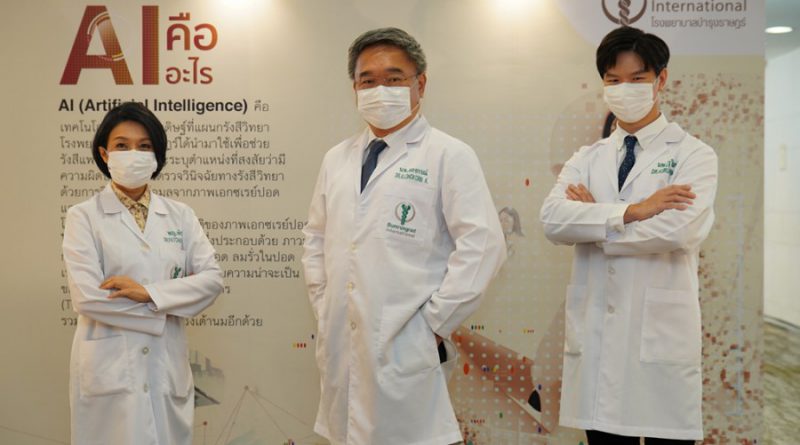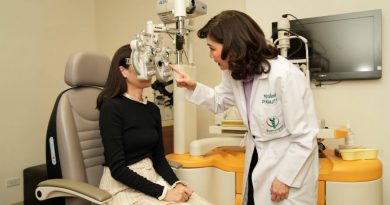Bumrungrad Hospital launches Radiology AI
Bumrungrad launches Radiology AI–assisting radiologists in analyzing & locating abnormalities in the lungs and detecting breast cancer.

At present, Artificial intelligence (AI) has attracted global interest because it can analyze large amounts of data to revolutionize businesses and industries, especially in the medical sciences. Further, it is indisputable AI plays a key role in increasing medical competency.

In the press conference “The Evolution of Medical Imaging Technology”, Pharmacist Artirat Charukitpipat, CEO of Bumrungrad International Hospital, discussed Bumrungrad’s vision and direction to continue creating innovative clinical experiences. Bumrungrad is one of the top hospitals in Thailand in terms of the adoption of the latest medical technology. We do research and use advanced medical technology including AI, Big Data, Genomics, and Scientific Wellness to assist our physicians and multidisciplinary healthcare professionals to deliver holistic healthcare services, resulting in the best possible treatments which meet international standards of safety.

The Radiology Department of Bumrungrad is a standout in adopting AI to treat patients because it was the first department using the AI technology. Radiologists are frontline physicians in the digital age. However, 22 years ago in the year 2000, Bumrungrad began using the Picture Archiving and Communication System (PACS) to collect medical images – particularly radiographs, to share with our staff for the first time as digital files. In 2001, Bumrungrad adopted Computer Radiography, which uses digital image plates to replace X-ray film radiography. The scanner then reads out the latent image from the plates before sharing them online. Physicians can either print the files on film or examine them on the computer. In 2007, the Bumrungrad Department of Radiology moved to digital radiography using digital detector arrays (DDAs), which provide high quality digital images and can upload them to our online system in seconds. There is no need for the scanner anymore.

Dr. Alongkorn Kiatdilokrath, Assistant Chairperson of Department of Radiology and Radiologist at Bumrungrad International Hospital, reveals, “Recently, Bumrungrad has adopted Radiology AI, which assists radiologists in screening, analyzing, and locating abnormalities in the lungs and detecting early stages of breast cancer. The Radiology AI deep learning algorithm forms large artificial neural networks to imitate how the human brain and the nervous system work. Hence, Radiology AI offers more accurate imaging and interpretation than other forms of machine learning, which only performs tasks based on past data. Moreover, Radiology AI can perform further data analysis and was approved by the U.S. Food and Drug Administration in 2021. Radiology AI is stable, accurate, and fast because it uses Microsoft Azure, an internationally recognized cloud computing platform.

Currently, Bumrungrad is actively using the Radiology AI in the check-ups, intensive care unit, emergency room, and more. There are two uses of the Radiology AI. Firstly, Radiology INSIGHT CXR analyzes an average of 100,000 chest x-ray images per year. Secondly, Radiology INSIGHT MMG supports the analysis of mammographic images to detect breast cancer. Through AI, Bumrungrad aims to deliver a meaningful patient journey by timely detecting cancer. With the expertise of our radiologists, the Radiology AI will further support Bumrungrad to drive international groundbreaking medical innovation.

Dr. Patcharee Prasitvoranant, Radiologist at Bumrungrad International Hospital, states, “In 2020, the National Cancer Institute reported 18,000 new cases of breast cancer in Thai women. There were 4,800 deaths from breast cancer, or 13 deaths per day on average. Breast cancer is still the most common form of cancer affecting Thai women and the number of cases rises annually. Women over the age of 40 should have a yearly mammogram. Currently, Bumrungrad uses Radiology INSIGHT MMG to screen, analyze, and diagnose early-stage breast cancer through mammographic images. In the past, radiologists read, interpreted, analyzed, and diagnosed medical problems just through imagery. However, the Radiology AI in medical technology is an adjunctive tool helping radiologists to analyze the images, making diagnoses more accurate. Radiologists diagnose breast cancer using the results of Radiology AI. If breast cancer is diagnosed early and the treatment process can start immediately, the 5-year survival rate is as high as 99%. If it is diagnosed later, the 5-year survival rate can decrease to as little as 86% to 29%, depending on how far the cancer has progressed. In sum, early diagnosis means a higher chance of successful treatment.”

Dr. Kuruwin Limsamutpetch, Radiologist at Bumrungrad International Hospital, adds, “The Radiology INSIGHT CXR is like an assistant to radiologists in spotting abnormalities in the lung – like malignant tumors, including small ones hidden in spots that are hard to diagnose. Moreover, Radiology INSIGHT CXR can detect active tuberculosis and diagnose emergency cases like pneumothorax. At the onset of pneumothorax, when air leaks just a little bit into the space between the lung and chest wall, the patient may not have any symptoms or just mild chest pain. If radiologists can diagnose it early and the Radiology AI results come quickly, the patient will not miss the chance to be treated. Research findings show that early diagnosed, lung cancer patients have a 5-year survival rate of 73%. But if it is diagnosed later, the rate drops to just 18%.

However, Radiology AI is not meant to replace the radiologist. It is a tool which assists diagnosis and radiologist decisions. In other words, it gives a second opinion. A survey found that more than 60% of radiologists find the Radiology AI helpful in helping to analyze the lung images. The Radiology AI software is in active development to increase its efficacy. Radiologist feedback at Bumrungrad is crucial to improving Radiology AI’s competency. The Radiology AI encourages radiologists, AI, and other physicians who treat the same patients to work cohesively as a team, resulting in effective treatments. The Radiology AI also successfully increases the pace of learning for new radiologists.

Dr. Alongkorn Kiatdilokrath concludes that in the future, Bumrungrad intends to form a partnership with the Radiology AI developer in South Korea and 20 internationally recognized hospitals to increase the effectiveness of Radiology AI by enabling it to diagnose disease faster and more accurately. The goal is to enable radiologists to diagnose a wider range of conditions. The partnership marks a milestone in modern medical technology, in which AI is an important factor for successful holistic medicine. The AI also improves the wellbeing of people worldwide.




